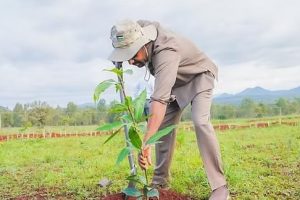
BY DARGIE KAHSAY
Advocators of soil preach that “without soil, there is no life.” Indeed everyone may not value soil in our day-to-day life, but without soil, life is unthinkable in this planet. Everything is a product of soil. The food we eat, the air we breathe, the water we drink, the houses we are living in…all are products of soil either directly or indirectly. If we see all these benefits of soil, life is unthinkable without soil in earth and it is natural to accept “no life without soil.”
Without soil, it is unthinkable to grow any single plant and without plants, there would be no air and rain. Without rainfall, there is no surface water. This shows that everything we are earning naturally are products of soil. Hence, advocators of soil are calling to give due attention to save and conserve soil and its fertility. Globally, research indicates that over 52 % of agricultural land is affected by land degradation. And this land degradation affects the continuous soil erosion and degradation, which needs due attention to conserve and save it.
Globally, in addition to the degradation and erosions, soil is losing its contents due to different deployments. In this regard, soil acidity is among the known impacts that the fertility of soil and soil acidity is a serious crop production problem which directly have an implication in food security and nutrition.
Ethiopian economy is dependent to agriculture, mainly small holder agriculture. Since the country’s arable land is ploughed for centuries with weak soil treatment mechanisms, the arable land soil is continuously degrading and losing its natural contents. Soil erosion, degradation and acidity are becoming serious challenges to the agriculture sector in Ethiopia and affecting the production and productivity. According to Ministry of Agriculture, soil acidity is becoming a serious problem in agricultural land and an acidic soil can decrease agricultural productivity by 50 %. Hence, for sustainable soil fertility, which is critical to sustain plant growth, it is important to give due attention to save, conserve and treat soil. In addition to conserving soil from degradation and erosions, it is important to treat soil with necessary plant nutrients so as to avoid soil acidity.
According to research, rainfall and leaching, acidic parent material, organic matter decay, harvest of high yielding crops and nitrification of ammonium are among the major causes for soil acidity. Ethiopian Ministry of Agriculture (MoA) discussed this week on soil acidity and its implications on agricultural productivity in Ethiopia. The discussion aims to solve the soil acidity problem in the agricultural fields and through soil treatment by providing limestone and experience exchange between farmers. In addition, the discussion aims the participation of the private sector in providing agricultural limestone to combat acidic soil.
Speaking at the event, Agricultural Supply Chief Executive Officer, Mengistu Wubishet stated that from the country’s total cultivating agricultural land, currently over 41 % is affected by acidic soil. He added that, from the total soil acidic affected cultivating land, 28 % of the agricultural yield is highly soil acidic and needs strong intervention for the continuity of agricultural production.
Mengistu reiterated that agricultural lime is the best and easy treatment mechanism to treat acidic soil in the arable land adding that to improve the provision of agricultural lime, the participation and involvement of the private sector is crucial. For him, in addition to expanding the provision of agricultural lime, stakeholders should work hand-in-hand to aware the farmers how to use the agricultural lime and its effectiveness to treat acidic agricultural field.
According to Mengistu, currently over 13.5 million hectares of land is cultivated across the country. As to him, the acidity of soil in agricultural land is increasing and a crop yield with over 5.5 % acidity highly affects the production and productivity of agricultural crops. In a high soil acidity agricultural field, crop productivity can decrease the crop productivity from 50 to 100 % of the potential productivity of the field with organic soil.
Wheat, barley, maize and beans are among the crops highly affected by acidic soil. Acidic soil is not only a cause for decreasing crop productivity but also limits the functioning of agricultural inputs used to increase productivity like fertilizers. Hence, for the sustainability of agricultural production and productivity, as the country is striving to fulfill its food security, it is critical to develop soil treatment through developing the use of agricultural lime in the acidic affect crop-fields.
According to experts in the sector, soil treatment with agricultural lime for acidic soil agricultural field can boost the crop productivity of the land by more than 70 % compared to the untreated acidic soil. As to MoA treated soil that was affected by acidity shows significant increment in crop productivity, according to its assessment. It reiterated that from a treated soil with agricultural limestone, productivity of wheat increase to 47 quintals, barley 43 quintals, beans 39 quintals and maize 51 quintals per hectare.
The Ethiopian Herald October 2/2022





